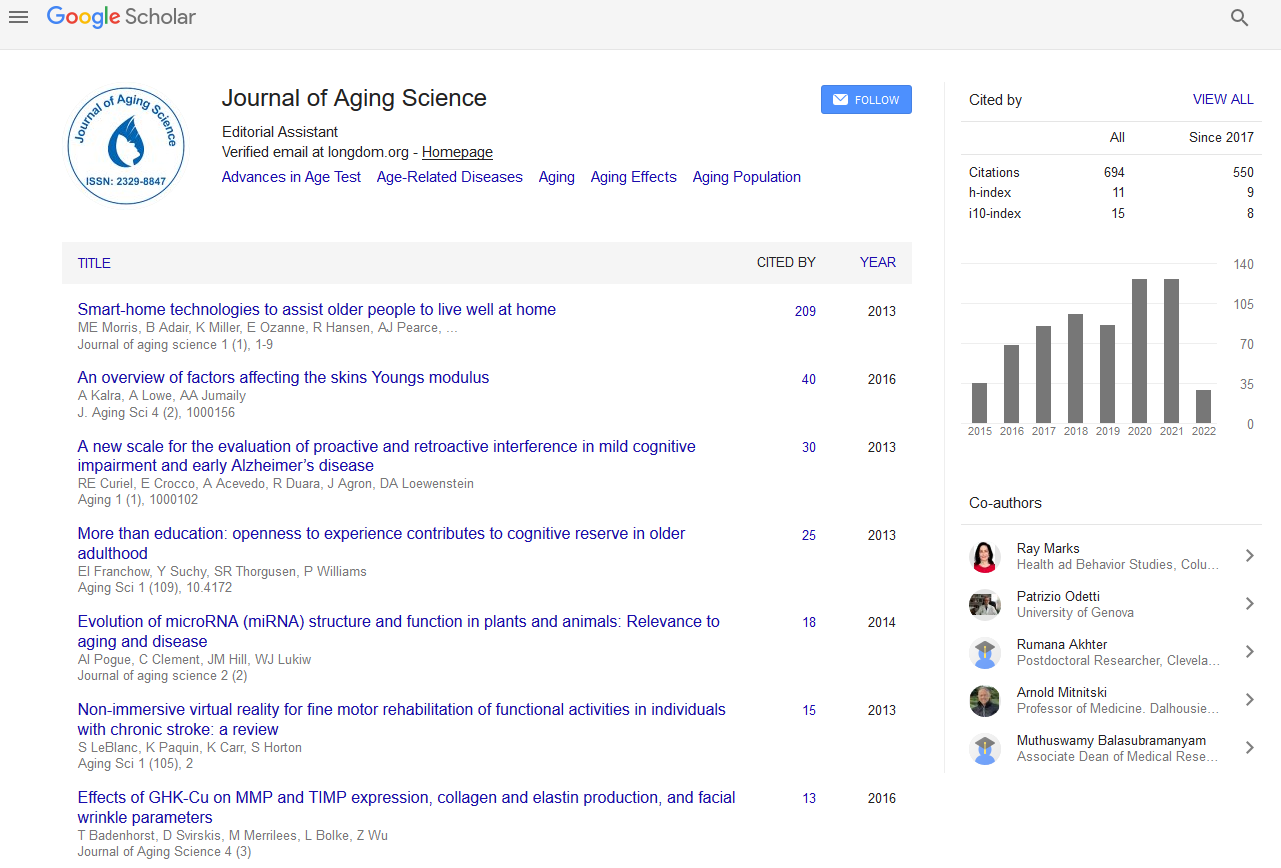PMC/PubMed Indexed Articles
Indexed In
- Open J Gate
- Academic Keys
- JournalTOCs
- ResearchBible
- RefSeek
- Hamdard University
- EBSCO A-Z
- OCLC- WorldCat
- Publons
- Geneva Foundation for Medical Education and Research
- Euro Pub
- Google Scholar
Useful Links
Share This Page
Journal Flyer

Open Access Journals
- Agri and Aquaculture
- Biochemistry
- Bioinformatics & Systems Biology
- Business & Management
- Chemistry
- Clinical Sciences
- Engineering
- Food & Nutrition
- General Science
- Genetics & Molecular Biology
- Immunology & Microbiology
- Medical Sciences
- Neuroscience & Psychology
- Nursing & Health Care
- Pharmaceutical Sciences
Use of Mancala/Sungka to reduce cognitive decline in institutionalized elderly in metro Manila
3rd International Conference on Aging & Gerontology
July 18-19, 2018 | Atlanta, USA
Raine Iris, P Verar, Mariah Danica R Velasco, Leah Angelika E Vicente, Carmella Marie H Villanueva, Beatrice L Villespin and Dennis S Cuadra
University of Santo Tomas, Philippines
Scientific Tracks Abstracts: J Aging Sci
Abstract:
Introduction: As people age, their mental and physical functions diminish due to their inactivity. The purpose of this study is to use Sungka to reduce cognitive decline and enhance cognitive aspects (memory and retention, attention and concentration, executive function, and mood) among institutionalized elderly in Metro Manila. Methods: The playing of Sungka was incorporated into a structured routine program, entitled COMPLY: Communicate-Move-Play (which includes social, physical and cognitive activities). The subjects were 12 elderlies, who came from an elderly institution in Metro Manila, selected under purposive sampling. The study was conducted for 45 minutes to one hour, once a week for four weeks. Quasi-experimental design was utilized through a pre- and post-intervention test using Mini Mental State Exam (MMSE). Two researcher developed tools were used in determining the effect of the structured routine program. The consent of the institution and the subjects were obtained and was assured that their privacy, confidentiality, and anonymity were secured. Measure of pre-and post MMSE scores of were analyzed through Dependent T-Test, while, cognitive aspects under the research developed tool were analyzed through repeated measures ANOVA. Results: Findings revealed that there is a significant difference between the pre- and post- MMSE (p=0.001). The results suggest that Sungka is effective in reducing cognitive decline in geriatric subjects. Further, attention and concentration were shown to have a significant change (F=4.600, p=0.030) indicating that the subjects were being taught lesser every session has transpired. However, memory and retention (F=1.882, p=0.169), executive function (F=0.792, p=0.502) and mood (F=1.0000, p=0.339) had no significant change. Discussion: The significant difference in the pre- and post- MMSE shows that the use of Mancala/Sungka can reduce cognitive decline among institutionalized geriatric subjects in Metro Manila. Further research is needed to extend the length of application of the said structured program.
Biography :
Raine Verar, Mariah Danica Velasco, Leah Vicente, Carmella Villanueva, and Beatrice Villespin are senior nursing students from the University of Santo Tomas, College of Nursing in the Philippines. They have studied gerontology and geriatric nursing in the oldest Catholic University in Asia. They were supervised and guided by Mr. Dennis S. Cuadra, a professor who is a Master’s degree holder in nursing. He specializes in adult health nursing and is currently teaching in the prestigious Catholic University of the Philippines. Their Mancala/Sungka wooden board game research intervention is a non-pharmacologic and cost-effective intervention, that aims to delay the onset of Dementia and Alzheimer’s disease and reduce cognitive decline among elderly people. The researchers incorporated the study into a structured routine program in order to promote socialization, exercise, and stimulate the cognitive function among the elderlies.
E-mail: raine.verar@gmail.com


